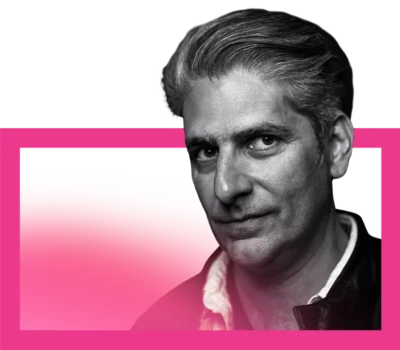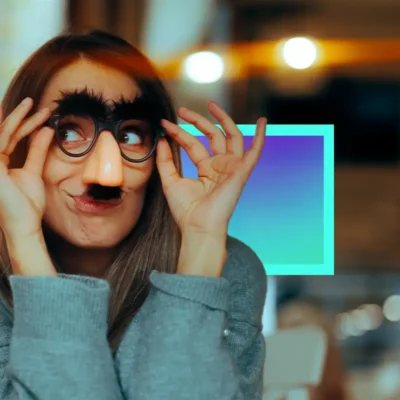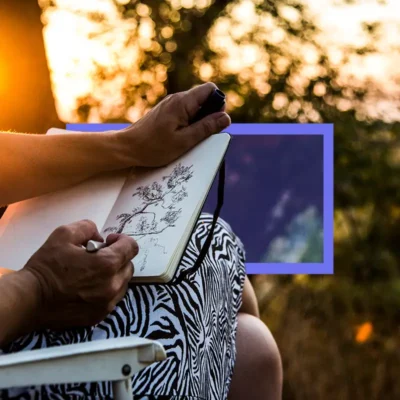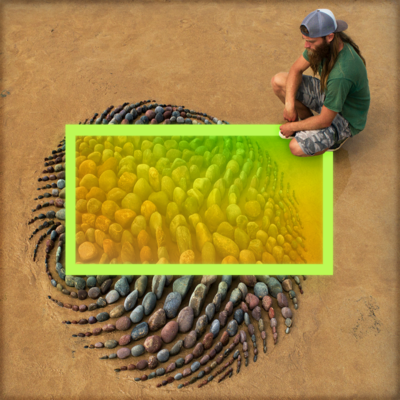Having the courage to create
When actor Michael Imperioli is 17, he makes an impulsive move: on the day he’s supposed to drive up to college, instead he takes the train down to New York City and signs up for acting classes. His parents are baffled, but they give him an enormous gift: they trust him. As he grows as an artist, Michael realizes the way that the courage to trust – in your instincts, in your teachers, and in one another – is what forms the foundation for a brave, creative life.
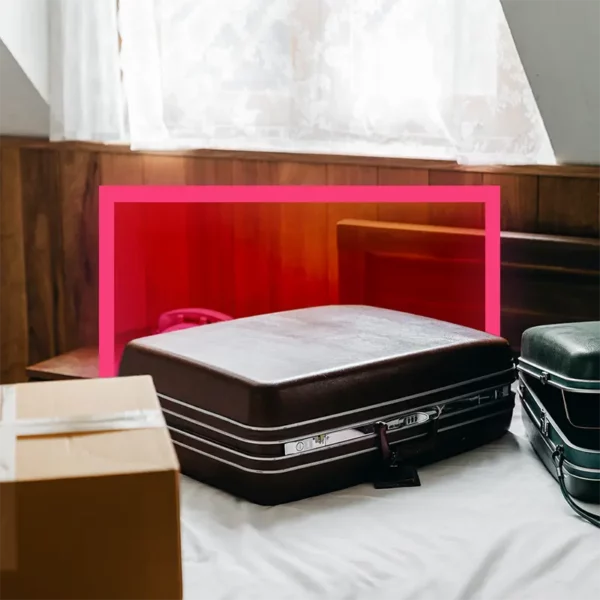
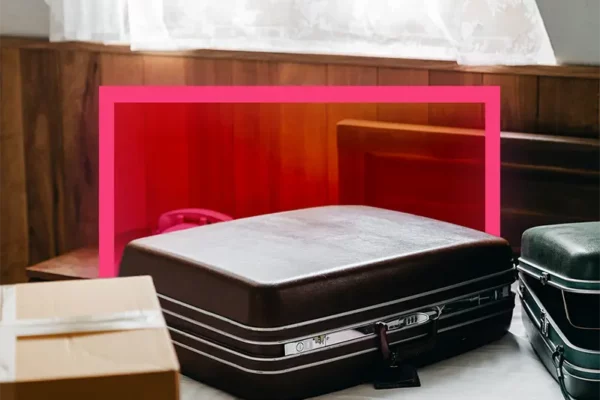
Table of Contents:
Transcript:
Having the courage to create
MICHAEL IMPERIOLI: My dad busts his ass driving long shifts and commuting. So he’s not home much. Growing up, we watch Dog Day Afternoon together so many times I lose count. It’s him at his happiest.
One day, when I was about 13, after dad’s been driving his bus in the Bronx, he bursts in the front door, out-of-his-mind excited.
“I might be in a movie! Or at least my bus might be!”
Turns out, he sees a movie getting shot on his route, it’s a movie called Fort Apache, The Bronx starring Paul Newman. And he drives by the actual camera. Maybe they can see his bus, too. That night, there’s this lightness in him, this energy.
Not long after, he tries out for his first community theater production. And he gets in. It’s a courtroom drama, and he plays the court clerk. There are a lot of nights when he gets home from a 12-hour shift, changes out of his uniform, and heads right back out to rehearsal. I am very proud watching him. Amazed at his courage.
Maybe that’s why he doesn’t stand in my way on that breezy and sunny September day.
ROHAN GUNATILLAKE: Martin Scorcese’s Goodfellas is one of my all-time favorite films. And if I’m being honest I was probably a bit too young when I first watched it, but hey whatcha gonna do? So I’m pretty excited that today’s story is from Michael Imperioli who in his 20s played the ill-fated Spider. However, he’s probably best known for his Emmy award-winning portrayal of Christopher Moltisanti in HBO’s The Sopranos, on which he was also a writer.
In today’s Meditative Story, we learn how Michael makes a difficult, life-changing decision that his father is surprisingly supportive of – for reasons that only became clear much later.
In this series, we combine immersive first-person stories and breathtaking music with the science-backed benefits of mindfulness practice. From WaitWhat, this is Meditative Story. I’m Rohan, and I’ll be your guide.
The body relaxed. The body breathing. Your senses open. Your mind open. Meeting the world.
IMPERIOLI: I’m all packed. Everything’s in suitcases and duffle bags. My clothes, school supplies, my vinyl records in a milk crate. Tomorrow, my parents are going to drive me two hours to Albany, New York for college. But I don’t want to go. I was at SUNY-Albany, the state university, earlier this summer for orientation. But it feels like a continuation of high school, just without parents around. I tell people I’m planning to study pre-med.
All summer, I have a hard time just getting out of bed in the morning. I lock myself in my room and listen to the same Queen album over and over. When I mow our half-acre of lawn, I sing. The mower drowns out my voice.
It’s too late to apply anywhere else. Move-in day is literally tomorrow. This moment is supposed to be exciting, but I’m feeling sick to my stomach.My best friend and I had both applied to Columbia. We were going to be roommates. Columbia sends this book with their application – a Columbia Student’s Guide to New York City. It talks about the East Village, bookstores, music venues, nightclubs, and restaurants. I’ve read that book, over and over – probably a hundred times.
My friend gets into Columbia. I don’t.
I’m not as disappointed about the Columbia part as I am about the New York City part. I love the city. Even though I haven’t been in a play since Oliver in the fourth grade, I love theater. All year, I’ve been reading plays in the library, like Death of a Salesman and A Streetcar Named Desire.
But I’ve never known anybody who creates characters or even art for a living.
My dad drives the same bus routes in Harlem and the Bronx as he has for decades. So when I think about actually becoming an actor, for my job, I realize it’s probably stupid and impossible.
I slowly drag my suitcases from my bedroom to the front door. My mother and father sit at the octagon-shaped table in our dining room. Mom digs into her purse and pulls out a wad of cash, a couple hundred bucks, so I can open up a checking account. She holds it out to me. Folded over and bulging a bit.
I take one step towards her and suddenly stop.
“Ma, don’t give me the money,” I say, shaking my head. “I don’t want to go.”
I’m surprised these words are actually coming out of my mouth. I can’t look at her. Silence.
I am a good student. I’m literally the first person in the family going to college. But they also love me. They’ve been worried about my summer depression.
I continue, “I really want to go into acting or something. Maybe I can find another college in the city that will accept me for January.”
My dad leans forward and pushes down against the arms of the chair as he stands up. I see something in his eyes that I don’t really understand. He puts a hand on each side of my face and says, “Listen, it’s your life. You have to decide what you want to do.”
A few days after I decide not to go to college in Albany, I walk from my house to the Brewster train station, buy a ticket to Grand Central station in New York City. All by myself – for the first time.
Riding past 125th Street, I feel a familiar burst of excitement. I flash to sophomore year of high school, when my teacher takes us to see the Broadway musical Barnum about the circus legend. It’s at the St. James Theatre, velvety looking seats. Balconies stacked on top of each other. Huge paintings on the walls and the ceilings. Glenn Close is right there in front of me on the stage.
In the lobby at intermission, there’s a little Museum of Barnum to honor the showman who parlayed fantasies into action. An actress in period costume stands next to a display case, quoting P.T. Barnum, “Whatever you do, do it with all your might!” I talk to her until they flash the lobby lights to tell us it’s time to return to our seats. It’s my first time meeting someone who is an actual actor, as a profession. The experience makes the world feel big and busy and full of possibility.
When the play ends, I don’t want to leave the city. I feel like I’m finally where I belong. But I have to get back on the bus for the two-hour drive home. I don’t say a word to anyone for the entire ride.
GUNATILLAKE: Let’s sit with Michael. Sensitive to the vibrations of the bus moving through his body. Sensitive also to the more subtle vibrations of insight. Feel whatever vibrations are here for you.
IMPERIOLI: Three years later, when I’m on the train from Brewster into New York City by myself for the first time, I think about my dad.
I am going to miss watching movies together. My dad busts his ass driving long shifts and commuting. So he’s not home much. Growing up, we watch Dog Day Afternoon together so many times I lose count. It’s him at his happiest.
One day, when I was about 13, after Dad’s been driving his bus in the Bronx, he bursts in the front door, out-of-his-mind excited.
“I might be in a movie! Or at least my bus might be!”
Turns out, he sees a movie getting shot on his route, it’s a movie called Fort Apache, The Bronx starring Paul Newman. And he drives by the actual camera. Maybe they can see his bus, too. That night, there’s this lightness in him, this energy.
Not long after, he tries out for his first community theater production. And he gets in. It’s a courtroom drama, and he plays the court clerk. There are a lot of nights when he gets home from a 12-hour shift, changes out of his uniform, and heads right back out to rehearsal. I am very proud watching him. Amazed at his courage.
Maybe that’s why he doesn’t stand in my way on that breezy and sunny September day.
When the train arrives at Grand Central, I walk out onto 42nd Street and then up 5th Avenue. People slide past me from so many different ethnicities, far more than I am used to seeing.
I crane my neck to see the soaring twin peaks of St. Patrick’s Cathedral. There’s a towering, glitzy, high rise that looks like it just went up yesterday. On 57th Street, I see a glass-fronted restaurant called New York Delicatessen. It smells like coffee and onions. I order a piled-high pastrami sandwich.
I keep walking west. I make my way to the Fordham University campus by Lincoln Center. I walk in through heavy brass doors, and get a brochure. It’s too late to enroll there, even for the January semester.
I go down the stairs into the warm draft of the subway, push my way through the turnstile and hop on a 1 train heading downtown. It smells like brakes. The entire car is covered with graffiti, inside and out. I’m definitely not in Brewster anymore.
I get off at Christopher Street, and walk a few blocks through Greenwich Village.
In Washington Square Park, I hear the shouts of a soccer game and the leather-on-leather slap of a ball being kicked. It’s a pickup game, mostly Jamaicans. I watch for a minute, then set down my bag, take off my jacket, and join in.
After tiring myself out, I find the official NYU admissions building. It’s too late to enroll there, too.
And I begin to walk back uptown, turning left and right to explore. I have this overpowering sense, as I walk among the street hawkers and the T-shirt shops, that I’m home here. It feels like a place where I could never get bored.
Along 14th Street, I see a street called Irving Place. I walk half a block, and suddenly I see this red brick building with a big flag: “Lee Strasberg Theater Institute.” It’s a famous Method Acting studio, but I had no idea it was there. I don’t even know where the hell I am. But I walk in. The man behind the desk tells me they’re accepting new students. So I sign myself up for an interview, and they let me in. Classes start next week.
GUNATILLAKE: You may know that Lee Strasberg is one of the central figures in the development of method acting. And one of the key elements is the release of tension, based on Strasberg’s belief that actors need to be a blank slate before they can truly embody the life of another person. So take some time now to practice that. Knowing where you are storing tension in your body right now and inviting it to release.
IMPERIOLI: My acting teacher is Elaine Aiken. She’s in her late 50s, early 60s, and there’s something very regal about her – her blonde hair in an up-do, and she has that starlet posture. I learn she’s a former Hollywood ingenue, a contemporary of James Dean and Marlon Brando. She used to be roommates with Marilyn Monroe. I can imagine her accepting a light from Tony Perkins.
The class is mostly people in their 30s – some in their 20s, 40s, even 50s. I’m around people of all different sexual orientations, from different countries, with different ways of looking at the world that I’ve never been exposed to.
We do relaxation exercises. We do sensory exercises. Like the “private moment” exercise where we recreate sensorily a place of significance. Elaine is very blunt, very honest. A lot of times, I don’t know what the hell she’s talking about – but I kind of pretend I do. I’m 17 years old. I’m always scared she’s going to find out that I’m faking it.
But even though she’s tough, Elaine sees I’m driven. She believes in me, the way I know my parents are trying to. At one point, she looks at me with those intense, no-nonsense eyes after class.
“You’re not just going to be an actor,” she says, “You’re going to be a writer. You’re going to direct. You’re going to do a lot of different things in this business.” I want to believe her, but it’s still all a little hard to imagine.
Midway through the year, Elaine takes me and a couple of other students to the Metropolitan Museum of Art to see an Impressionist exhibition.
At first, I’m like, “Why are we going to the museum?” Elaine says, “You don’t have to go to college, but you’ve got to read good literature, you’ve got to learn about art.”
I walk past paintings by Monet, Picasso, Gaugin, reclining women, tigers, lily pads. One particular piece draws me toward it. It’s by Van Gogh, and it’s called “Rain.” It’s a small painting, most people walk right by it. But I stand in front of it for 20 minutes, just staring.
It’s a view through a window onto a piece of farmland. A field with a fence around it. Darkened hills in the background. A bit of road. A cloudy sky. And all these raindrops streaking past the window pane in sharp dark lines.
The painting feels like a window into Van Gogh’s psyche. I picture him with his palette and his brushes and canvas, painting a field in the rain. He captures his struggle with mental illness in brushstrokes and color. It hits me in a very clear way. In a way I haven’t experienced before.
I get it. I get why Elaine brought us here.
For the first time, I see that powerful art comes from a sense of compassion for the frailty and the faults of being human. We’re all hurting, and we’re all trying to share our struggles with each other.
I think about my dad again. It’s the middle of his shift at work right now. He can’t spend a whole afternoon wandering around an art museum. He doesn’t have the time to stare at a single painting and let it really sink in.
But he has the same drive to express himself that I do. That Van Gogh did.
When I’m 22 and working in a chili restaurant in Tribeca, I get to produce my first play in New York. My father has been coming into the city sometimes to watch me perform. And now I get to cast him in a small part. It’s an Arthur Miller one-act set in France during World War II, with a group of men arrested and unsure of what’s going to happen to them.
My dad shows up to every rehearsal early, after working a full shift on the bus. He goes deep into his character’s motivations even though he’s only got a handful of lines. He lets himself be vulnerable and honest. And even though he doesn’t have a lead role, I can’t take my eyes off him when he’s on stage.
When I was 17, it took a lot of courage to come to New York without a plan. But watching my dad, I imagine what it’s like to be a bus driver in your 50s, with no theater training, and stepping out in front of an audience night after night. I think about how hard it must be to trust and collaborate with a bunch of 20-somethings who don’t really know what they’re doing.
So yes, it took courage for me to ditch the college plan, but it also took courage for my dad to let me. Seeing my dad on stage, I realize he’s been the brave one all along. He’s why I’m here, too. The two of us, watching each other.
Rohan’s closing meditation
GUNATILLAKE: Thank you, Michael.
I want to go back to a moment from Michael’s story which really caught my attention. And I suspect that is because it really caught his. Michael standing in front of the Vincent Van Gogh painting at the Metropolitan Museum of Art.
If the painting that so captured him is the one I think it is, then its permanent home is the Philadelphia Museum of Art, but it spent time in the mid-80s on tour in New York where Michael saw it.
It is as Michael describes it so well. Farmland. Driving rain. The fenced-in field. The hint of freedom on the distant hills. Van Gogh painted it in the last year of his life while a voluntary patient in a hospital just northwest of Marseille.
In many ways, it’s an expression of his state at the time.
So take a few breaths, remember the importance of the clean slate in Michael’s training, and release any tension that’s here.
Notice it, name it, let it go.
Tight shoulders, I know you. I’m letting you go.
Jaw. I feel you holding there. I’m letting you go.
Chest. Belly. Softening you, too. Letting you go.
Breathing soft and open.
Refreshing.
Clean slate.
And if you’d like to actually pause the podcast and look at a picture of “Rain” by Van Gogh, I’d invite you to do that.
Or just as fun, imagine it based on Michael’s words:
It’s a view through a window onto a piece of farmland. A field with a fence around it. Darkened hills in the background. A bit of road. A cloudy sky. And all these raindrops streaking past the window pane in sharp dark lines.
And in that moment Michael is Vincent looking out that window.
Can you feel that? Get even the tiniest sense of that?
Now zooming out and seeing Michael standing here, absorbed. Standing here for 20 minutes, no time at all from his perspective.
Echoes of Siri Hustvedt’s Meditative Story back from Season 1, if you remember it.
Absorbed. Alive. What is here for you that invites absorption? A sensation, memory, something you can lose yourself in. Trust your instinct and let your attention settle here.
Enjoying it. Joying it in.
Leaving Michael in the gallery for now. And zooming out one more time.
A part of why we make Meditative Story is that we believe when we deep someone else’s story, it can bring insight to our own. So let’s catalyze that process by bringing to mind the part of Michael’s story that resonated the most with you.
No rush.
Just flick back to what you remember of the story and recall the scene or feeling that is most present with you now. And drop into it. No need to analyze it in anyway. Just drop into it. Like a hot bath.
Just rest your mind with it. Like a bench in a park. Taste it in your memory. Like a cool glass of water.
Thank you, Michael. And thank you.
Be well, and stay safe.

